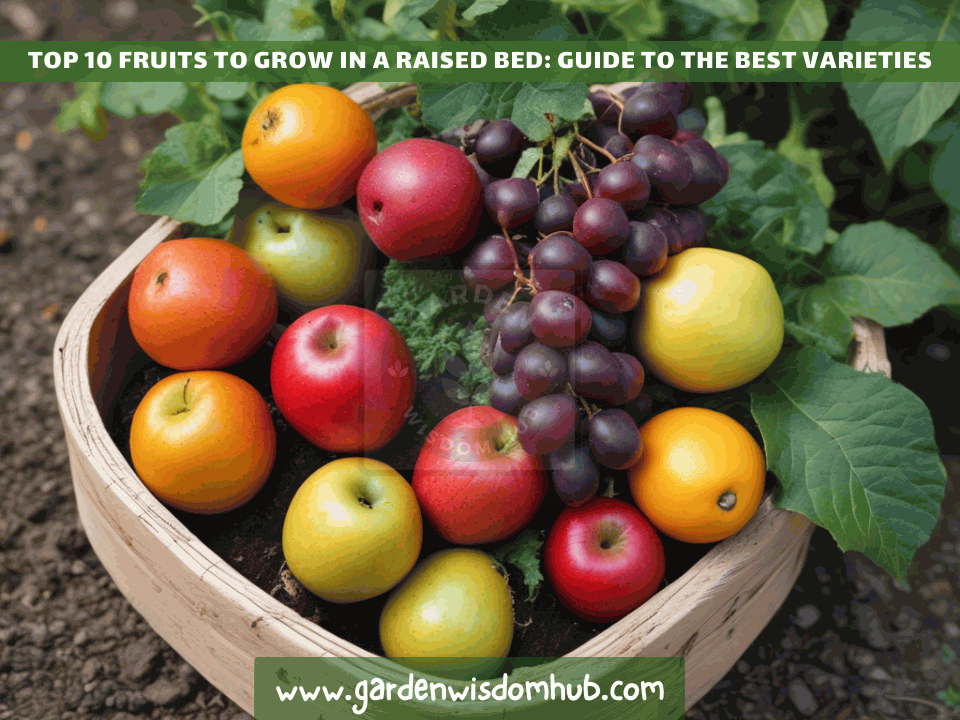Best Fruits to Grow in Raised Garden Beds:
Planting fruits on raised garden beds is fun. Raised beds are perfect for growing strawberries, figs, honeyberries, apples, cherries, plums, peaches, currants, raspberries, and watermelons. These will delight your taste buds! These fruits thrive in raised beds! They love nutrient-dense soil and are easy to care for in a raised bed’s warm atmosphere.
What Fruit Grows Well in Raised Beds?
Are you looking for the perfect raised bed fruit? Do not look further! We provide excellent plants for your elevated garden. Prepare to enjoy a bountiful harvest and impress your friends with your plant-growing skills. Fruit-raised beds resemble VIP areas. They thrive in these beds due to the high-quality soil and drainage. Many fruits thrive in raised beds.
This category includes the following:
- Watermelons
- Strawberries
- Figs
- Apples
- Cherries
- Plums
- Peaches
- Currants
They can’t resist a raised bed’s warmth and appeal. Due to their optimal growing conditions on raised beds, these fruits developed a green thumb. The lush soil and controlled atmosphere have allowed us to grow healthy plants and harvest abundantly. The place is a fruit paradise!
What Not to Plant in Raised Beds?
Despite their versatility, raised beds may not work well for some crops. I assume you want those huge fruit plants. To be honest, apple and cherry trees are picky about their soil. They dislike shallow raised bed soil and prefer deep, well-drained soil. If you want those trees to thrive, find some traditional deep soil. Blueberries thrive on acidic soil, so it’s important to modify it. Instead, they may struggle.
What Are the Best Foods to Grow in a Raised Bed?
Raised beds may grow a variety of vegetables, herbs, and delectable fruits. Raised bed vegetable gardening is fun. Lettuce, spinach, radishes, carrots, basil, and parsley are examples. We also have root vegetables. Your taste receptors will think they’re seeing a comedy!
These vegetables are good for raised beds since they can be planted close together and harvested multiple times, maximizing space efficiency.
Best Fruits Planted on Raised Garden Bed:
Your raised garden bed should grow these fruits: Planting fruits in raised garden beds gives you many delicious and nutritious options.
This category includes the following:
- Watermelons
- Strawberries
- Figs
- honeyberries
- apples
- cherries
- plums
- peaches
- Currants
- raspberries
Why these fruits?
Watermelons:
Who knew raised beds favor these luscious fruits? The raised soil temperature acts like a hot tub for watermelons, allowing them to grow quickly. Since raised beds are managed, water drains well, thus no soggy melons!
Strawberry:
Raised beds keep them dry and reduce waterlogging, so they adore them. Elevation prevents decay and vermin from disrupting their wonderful party.
Figs:
Raised beds are figs’ paradise! The soil can be customized to provide the right drainage and aeration. This deluxe spa for roots ensures they thrive and grow to their hearts’ desire.
Raised beds are perfect for honeyberries!
These little berries enjoy the well-draining soil like a spa, mirroring their mountainous habitats. Remember that raised beds make it easy to protect them from ground-dwelling pests. Our lovely honeyberries are protected!
Apples:
Who knew raised beds could grow apples? These apple trees can thrive with adequate soil preparation and spacing. These trees need airflow and drainage to thrive.
Cherries:
They love raised beds. Maybe the warmer soil encourages early flowering and fruiting. Remember the enhanced drainage that keeps those roots dry. Nobody wants damp cherry tree roots. So grow cherries in a raised bed for VIP treatment.
Plums:
Who knew plums were so soil-picky? A somewhat acidic pH, adequate drainage, and lots of organic debris are needed. This is like their own spa treatment for optimal growth and fruit production!
Peaches:
Who knew these delicious fruits were so laborious? But fear not—raised beds let you pamper your peaches. The well-draining soil will keep their roots happy and prevent waterlogging. Plus, the higher height makes pest and disease control easy. Your peaches are protected!
Currants:
Raised beds’ wet soil helps currants grow and produce fruit. The beds’ elevated height makes harvesting easy!
Raspberries:
Who knew they were so finicky? They thrive in raised beds with all the organic goodness they want. Plus, the higher height offers you an edge over weeds and pests. Giving your raspberries VIP attention ensures their health and growth.
Having a fruitful paradise in your backyard is heaven! These fruits thrive in raised beds! They can’t get enough of the beautiful terrain and nice atmosphere. They treat it like a spa resort and give you ample crops. This circumstance benefits us all!
What Grows Best in Raised Beds?
Raised beds incite plants to resist. Their soil and drainage make it like a five-star resort for growing fruits and veggies. Growing your food in raised beds can be fun. These beds are great for growing strawberries, figs, apples, cherries, plums, peaches, currants, raspberries, and watermelons.
Thus, prepare to work hard and enjoy the benefits! Raised beds’ nutrient-rich soil and controlled environment make these crops thrive and provide plentiful harvests and healthy plants.
Factors to consider while choosing fruits:
Along with the benefits of growing fruits in elevated garden beds, there are a few other factors to consider:
Effective Space Use:
Raised beds are gardening superheroes since they maximize plant growth space. These people are like plant Tetris masters because they can accommodate as many plants as possible without breaking a sweat. The gregarious butterflies of plants surprised me. Space your plants closer together to create a small plant party and develop more fruits. This lets you grow more vegetables. Like a delicious party!
Weed Control:
Why have a weedy garden when you can have raised beds? These bad boys are like weed warriors—they prevent unwanted seeds from sprouting and make it easy to remove any that do. Who needs to waste time and energy on maintenance? Who needs a castle with higher beds?
Pest management:
These fully armed bad boys have all the necessary equipment to keep pests away. Birds, bunnies, and annoying insects can be eliminated with nets and covers. Your fruits will remain safe and ready to enjoy without unexpected guests! This reduces chemical pesticide consumption and promotes organic gardening.
Temperature Regulation:
Raised beds eliminate the difficulties of cold or damp soil, which can ruin sensitive fruit harvests. Elevated beds regulate temperature, keeping your plants warm and comfortable throughout the growing season. This easy method helps you grow more delicious fruit and enjoy it for longer. How about a win-win!
Individual Changes:
Raised beds can be customized to every gardener’s dreams. Sculptable raised beds are gardening’s chameleons. Because they come in all sizes, shapes, and heights, you may find one that suits your fruits and garden arrangement.
Soil conservation:
Raised beds conserve soil like mini-superheroes. They save the day by preventing soil erosion and compaction. Their help will keep the land healthy and rich for years. Thus, it is well known that creating the optimum atmosphere for our beloved fruits is difficult.
No worries, gardeners! With a little experience and magic, we can create a Mother Nature-pleasing growth environment. We shall enjoy the fruits of our labor and advance environmentally responsible gardening. Friends, everyone wins here!
Aesthetic Appeal:
Garden beds are like garden fashion models—they add color and make the garden seem wonderful. You can also call them elevated garden beds. They seem nice and orderly, with distinct boundaries that match the surrounding plants and hard landscaping.
When looking at these additional aspects, elevated garden beds are beneficial for fruit cultivation. They are like a home garden’s secret weapon.
Conclusion:
In a nutshell, raised garden beds are like royal treatment for fruit cultivation. They offer well-regulated, nutrient-rich soil, good drainage, and easy maintenance. These planters can grow strawberries, figs, apples, cherries, plums, peaches, currants, raspberries, and watermelons. They’re great for growing many fruits.
These fruits thrive in raised beds with rich soil and controlled circumstances, so they produce many delicious harvests and grow rapidly. Raised beds can revolutionize gardening. They are like a secret weapon for beginners or those with physical limitations.
Growing fruits on raised garden beds is like having a little paradise in your backyard. In addition to improving your garden’s efficiency and letting you taste your vegetables, it adds charm. Raised beds are like Swiss Army knives for fruit gardening. This applies to both rookie and seasoned gardeners. They are useful, fantastic, and versatile.
Wacth this Video For More Guide: Beginner Raised Bed Garden Mistakes to Avoid
FAQs About Fruits to Grow in a Raised Bed:
What Is the Easiest Fruit to Grow in Your Garden?
Strawberry gardening is easy, especially in raised beds. Since they produce so much sweetness, these plants are like the present that keeps on giving when properly cared for.
Strawberry plants grow well in raised beds because they don’t need much room. Fruits like figs, raspberries, and currants are easy to grow and abundant. Raised beds have nutrient-rich soil that these small fellas love.
What Grows Best in Raised Beds?
The category of fruits that grow best in raised beds are the following:
- Watermelons
- Strawberries
- Figs
- Honeyberries
- Apples
- Cherries
- Plums
- Peaches
- Currants
- Raspberries
To learn more about Vegetable Garden Check out Our Guides:
A Guide to Spring Garlic Planting
Ultimate Guide to Growing Carrots in Containers
Ultimate Flowers to Plant Guide
Best and Worst Carrot Companion Plants
Best Vegetables to Grow in a Raised Bed from Seed
Guide When to Pick & Harvesting Carrots
Garden Experience by Companion Planting with Peas
James Porter
Welcome to our haven of gardening and plant care, where outdoor and indoor planting enthusiasts come together! At Gardening Wisdom Hub, we aim to provide you with the most authentic information on anything related to gardening, plant care, seasonal planting etc.
The author of our website is James Porter, an experienced industry veteran. He has a deep interest in everything green. James’s enthusiasm for exploring plants’ features and learning new gardening methods began at a young age. Gradually, his passion increased with time, leading him to become a highly esteemed professional. His extensive knowledge makes him a priceless resource for inexperienced and seasoned gardeners.

